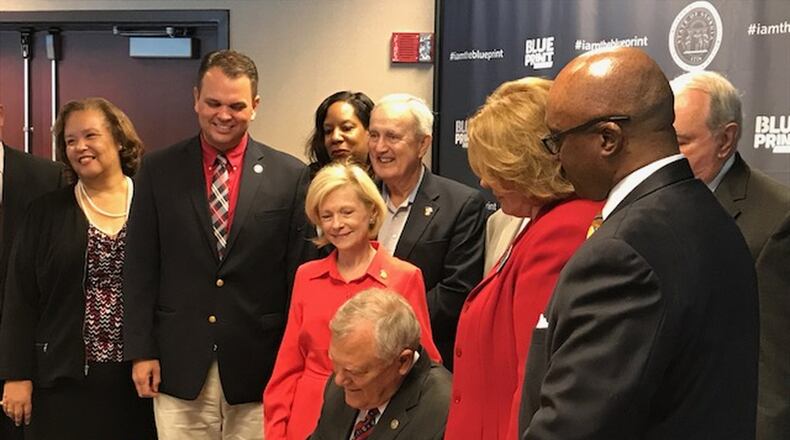Georgia has seen a surge of children needing foster care while at the same time facing a shortage in foster care homes.
So the state this month is funding the biggest increase in “per diems” for foster parents in more than a decade. The daily allowances, which help pay for kids’ basic needs, are going up by as much as $10 a day, with additional money being put toward hiring more resource staff to help with foster families’ day-to-day needs.
It became official Saturday, when the state's new fiscal year began. All told, the state is spending an extra $19 million this year to cover an effort that advocates hope reverses course and keeps more foster parents in the system.
“I’ve been in Georgia for 12 years now, and there’s never been an increase of this type,” said Bobby Cagle, the director of the state Division of Family and Children Services. “I think it’s probably one of the most important things we’ve done for a long time.”
The need has been palpable, advocates say.
The state saw 8,361 foster children logged into the system in January 2014. By the end of this year, that number is projected to be around 13,000 kids — a 55 percent increase over the past three years that comes as the state has also struggled to keep foster parents in the system and available to quickly welcome these children into their homes.
According to an analysis done by DFCS, a heavy recruiting campaign has been offset by foster parents dropping out of the system or at least taking a break from taking in more children.
Cagle estimated the system has lost 81 percent of foster homes over the past three years, something that rings alarm bells for state officials who are well aware of the increasing number of kids who need help.
The division has especially attempted to prioritize placing children as close to their home community as possible so they can continue to see their friends and go to the same school and church.
“I knew we were recruiting a number of foster homes,” Cagle said. “I could not figure out why we were still having trouble placing kids in their home county.
“Well, it was because we were losing one home while gaining one,” he said. “That was pretty alarming.”
Since Cagle took over the agency in June 2014, the state has spent tens of millions of dollars in an ongoing effort to hire more caseworkers and ramp up resources. The state is also increasing starting salaries by more than 19 percent — something officials hope will help lower an annual turnover rate of 32 percent to 39 percent, depending on the area of the state.
The increased per diems for foster parents, however, go to much more basic needs, such as buying diapers and baby formula or even paying for extra trips to the grocery store or doctor’s office. The payment varies based on how old a child is (for example, the state previously gave $16 a day for a child age 10 to 12), and do not include additional money that may be available from Medicaid for needs such as psychological care.
“Almost every child who has come into our home, their nutritional needs weren’t being met,” said Shelley Elliott, a social worker who with her husband became foster parents when they moved to Kennesaw about four years ago.
It ranged, she said, from children not getting multivitamins to those who had never had fruits and vegetables.
Her family — which includes a son, 17, and daughter, 15, whom Elliott and her husband adopted a year and a half ago — caters to older foster kids. They’ve never had a child under age 12, a decision they made when they started fostering.
Elliott said when they went in for training, everyone seemed to be there planning to foster children who were 5 years old or younger.
“Our faith is a central part of this journey for us,” she said. “We looked at each other and said, ‘Do you think we’re supposed to take teenagers?’ ”
The per-day payments, Elliott said, don’t cover the full extent of costs. It is, however, a cushion. And every extra bit helps.
“We went into this knowing that it’s not going to cover every expense,” she said. “But it’s a huge help.”
By the numbers
Budget increases took effect Saturday for the state Division of Family and Children Services, including:
- Increased per diem for DFCS foster homes by $10 day: $10.7 million
- Increased per diem for private agency foster homes by $5 day as first year of two-year planned increase: $5.2 million
- New DFCS staff for foster care support services: $2.8 million
STATE GOVERNMENT COVERAGE
July marks the beginning of the Georgia state government's fiscal year, when most of the legislation that the General Assembly approved in its previous session takes effect. To see articles about what the Legislature did in 2017 and how it affects Georgians, go to http://www.myAJC.com/politics.
About the Author
Keep Reading
The Latest
Featured



